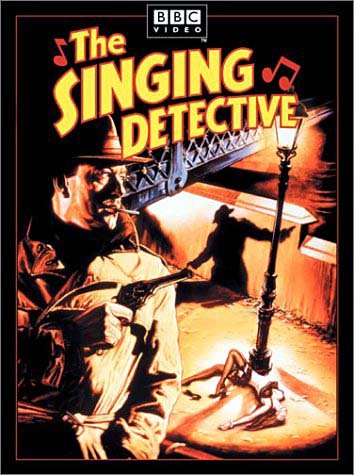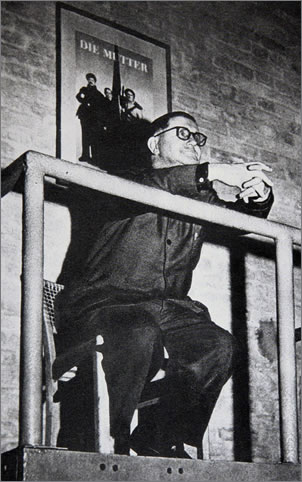March 09, 2007
Misuc in our mess-age
 |  |
A few weeks ago, after I had written about Robbie as a paragon of PoMo, Daniel posed a question to me: weren't the features I was ascribing to Williams - distanciation, irony, acting 'as if' he were a pop star - exactly those of the Brechtian alienation effect?
The answer to Daniel's question is provided by Owen in the course of a tremendous post on the Brechtian 'Verfremdungseffekt'.
- Soon before he died, Brecht spoke of how ‘all that remains of the Verfremdungseffekten is the ‘effects’, stripped of their social application, stripped of their point.’ While the theatre might totally disdain it in favour of realism, you can find this all over the 21st century cultural-political landscape: a kind of cynical Brechtian where the alienation effect’s insistence on the stepping in and out of roles is a way of avoiding ever actually saying anything, of ever committing ... This version of Brechtian technique is never truly dissonant or disjunctive, and is able to exist only because of the absence of two important components of the Epic Theatre’s Apparatus. First, the absence of the democratisation of the apparatuses, and second the absence of the political, educational project.
Williams' battery of stage tricks is one of many examples of the way in which postmodernism has recuperated the alienation effect. Robbie's reflexive tics function, not to lay bare the structures beneath and behind performance, but to draw attention to his loftily transcendent ego, which is always positioned above and outside performance. By contrast with 'Brecht’s works', which are 'absolutely full of singing, dancing, rhythm, laugh-out-loud jokes, wickedly biting irony, and perhaps most importantly, a refusal to ever be boring', there's always been a joylessness, a refusal to give in Williams' cheeky chappy song-and-dance routines.
One interesting - and, on the face of it, surprising - component of Brecht's theory is in fact the role it ascribes to music (or what Brecht, to differentiate his use of songs and sound from the 'ceremonial' use of music in the classical concert hall, called 'misuc'). We're accustomed to regard music as a mystifying force, beguiling, rhapsodic, anti-reason. Yet Brecht thought that music should play the role of interrupting somnambulent immersion:
- ‘Music had the task of protecting the audience from a state of ‘trance’. It did not serve the enhancement of existing or anticipated effects but rather interrupted or manipulated them. So if there were songs in a play, it was not as if the story ‘dissolved into song’. The people in the play did not break into song. On the contrary, they openly interrupted the story. They assumed a pose for singing and presented the song in a way that did not fully correspond to the situation.’
The Musical emerges as a fundamentally avant-garde form, profoundly anti-naturalistic. Songs are able to shake us from our trance not by virtue of any inherent properties of music itself, but because they cannot be made ontologically consistent with realism. Songs erupt into the diegesis, dissipating its spell.
Owen's invocation of Dennis Potter here is surely entirely apt. Pennies from Heaven and The Singing Detective operated as a pulp modernist reclaiming of the reflexive techniques postmodernism had appropriated and tamed. Potter demonstrated that reflexivity need not function either as narcissistic indulgence or as a bar to enjoyment; and that works which exemplified the Verfremdungseffekten could be extremely popular without being populist.

The same goes for Public Enemy, also cited in Owen's piece. Using the Bomb Squad's shock tactics, PE explicitly aimed to use sound to 'wake us up', to shake their audience from media trance: 'too many people are sleeping while standing up'. We're no longer supposed to mention PE (too 'rockist'), but they functioned for those of us of a certain age much like The Clash supposedly operated for a previous generation, as politicisers and mythographers, uniting sonic intensity and experimentalism with didactism in a way that Strummer and co could only dream of.
Unlike rock, which inherits Romanticism's will-to-trance, rap has always been meta-textual, eternally vigilant, pathologically awake to the point of insomnia. Hip hop continually draws the audience's attention to the different ontological levels at play in the 'text': the rapper's boasts reminding us that a performance is happening, the surface noise of the record itself becoming incorporated into the track, the disjunctures and incongruities of the samples functioning as a literal 'making strange' of musical history. Yet the once shocking alienation effects produced by hip hop have long since been naturalised, with rap now established as both an entertainment genre and a form of 'realism'.
Owen sets Brecht up against Beckett (or at least the middle-brow version of Beckett, which casts him as the lone, tortured artist). In terms of fiction, Beckett's anti-type might well be Burroughs, who, as Daniel pointed out in his Kino-Brecht essay (not yet online) was a follower of Brecht. Even though he greatly admired Beckett - an admiration that was not reciprocated - Burroughs himself saw Beckett as his opposite. 'Beckett is journeying inwards, I am journeying outwards', Burroughs said. There was much more to their differences than that - but perhaps what they had in common was a refusal of realism; Beckett gradually paring representation back, producing texts that were something like the equivalent of abstract paintings, Burroughs going in the direction of fragmentation, citation and collage.
All of which puts an interesting perspective on what Carl is calling 'the New Solemnity'. Perhaps the reason that japesterish irony and po-faced belief can so easily resemble one another is that they are not opposites so much as flip sides of the same coin. I say this as much as a reproach - and reminder - to myself as anything else.
I suppose I first confronted this conflict of aesthetic visions when I tried to reconcile listening to The Fall with listening to Joy Division as a teenager. It wasn't only Joy Division's solemnity which The Fall were implicitly antipathic towards; it was the very seamlessness of Joy Division's aesthetic which The Fall - with their rap-like reflexive self-awareness, their parodies, their continual breaking of frame, blew apart. Joy Division made good on the promise of Romanticism, dwelling in a dark night of Dionysus denuded of all revelry and reduced to the pure lust for abolition. What entranced was their psychological realism, their metaphysics of presence, the illusion of telepathic contact with another's mind. The Fall rejected Romanticism absolutely. Yet, at their best, like Potter and PE, they showed that seriousness need not entail religiose solemnity, that enjoyment and thinking could be mutually intensifying rather than mutually exclusive, that de-naturalisation would not have to be concomitant with de-libidinization.
The profound relevance of Brecht, then, as a reminder, in fact, that 'enjoyment' is intertwined with 'making strange'. Here - and mindful of Simon's recent exasperation at popism's eternal sunshine of the spotless mind - it is worth re-asserting the distinction between pleasure (a return to previous satisfactions, according to Freud) and an enjoyment that lies beyond the pleasure principle.
Interestingly, a while back Fire in the Mind actually asked 'whether K-punk is in any way still capable of truly enjoying music'. 'Eventually,' he goes on, 'I always start doubting those meticulously constructed theories, because I suspect the words were there almost at the same time as the aesthetic experience itself.' This assumes an opposition between thinking/ writing and 'aesthetic experience' which cries out for deconstruction - using 'deconstruction' very technically to mean an unsettling of the metaphysics of presence. Fire in the Mind is by no means a popist, as far as I can tell, yet what he appears to share with popism is a privileging - I would say a mystifying - of the category of 'aesthetic experience', whose alleged purity is to be set against the corrupting mediations of language/ writing.
Simon argues that it is impossible to write about 'a record entirely in terms of its pleasurability. I guarantee by the middle of the second paragraph you’ll be reaching for some kind of measure of significance or relevance.' I would go further: it is impossible to take any pleasure from music if you focus entirely on its hedonic qualities alone. Leaving aside the Lacanian wisdom that enjoyment is only possible if there are impediments to it, the popist aim to 'eliminate all obstacles to pleasure' makes hedonism a kind of monastic discipline which, taken to its logical extreme, would require that we encounter pop as abstract quanta of pleasure-inducing stimuli, devoid of all associations and cognitive content. (Here popism has an affinity with the Deleuzian quest to encounter raw intensities.) The imperative that we make ourselves a tabula rasa, an empty self open to all and any pleasure, actually ends up as a form of ascetism, as demanding and austere as any Kantian call for disinterestedness.
Insofar as there is an 'aesthetic experience' - and I suppose the lesson I was trying to draw from Brechtianism was that we ought to be very suspicious of that category - it seems to me indissolubly bound up with cognition and reflection. Writing about pop is not some grim duty, grave and heavy, which distances you from enjoyment. On the contrary, writing and thinking are a continuation of the enjoyment of the 'music itself'. When I write about pop, I do not only seek to represent some pre-existing enjoyment; I seek to intensify and extend the enjoyment that I take from listening. It is an auto-erotic process, which more often than not makes me enjoy the 'experience' of a record more when I return to it. In this way, the enjoyment of the music is not confined to the times when one is actually listening to it; the images, thoughts and affects which the music throws up linger long after the record has stopped playing.
Posted by mark at March 9, 2007 12:55 AM | TrackBack